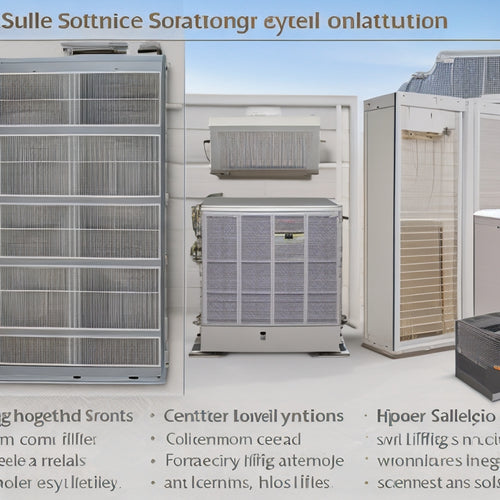
Why EV Range Anxiety Disappears With Renewable Solutions
Share
As you switch to electric vehicles (EVs), you'll find that renewable energy solutions play an essential role in alleviating range anxiety. By relying on solar power, wind energy, and hydropower, you'll have a consistent supply of clean energy. Biomass and geothermal energy can also supplement your energy needs. Plus, carbon offset programs and renewable energy credits help neutralize the climate change impact of EVs. With energy storage solutions and grid integration, you'll have seamless access to green energy for charging. Now, imagine having real-time range estimates, optimized energy consumption, and a reduced carbon footprint - the benefits of renewable solutions are just the beginning of your sustainable driving expedition.
Key Takeaways
- Renewable energy sources like solar, wind, and hydro power provide a consistent supply of clean energy, reducing reliance on fossil fuels and alleviating range anxiety.
- Carbon offset programs and Renewable Energy Credits help mitigate the environmental impact of EVs, neutralizing their climate change impact and promoting sustainable energy.
- Sustainable driving practices, such as route optimization and energy monitoring, minimize energy consumption and support a seamless charging experience without compromising values.
- Real-time charging information and growing charging station infrastructure provide EV owners with convenient and reliable access to green energy, diminishing range anxiety.
- As the grid integrates more renewable energy sources, EVs can optimize energy consumption, reducing their carbon footprint and contributing to a sustainable transportation system.
Renewable Energy Sources Matter
Your reliance on electric vehicles (EVs) highlights the significance of renewable energy sources in mitigating range anxiety. By leveraging solar power, wind energy, and hydropower benefits, you can guarantee a steady supply of clean energy.
Additionally, biomass potential and geothermal energy can further supplement your energy needs. To optimize energy accessibility, energy storage solutions and grid integration are essential.
Governments offer renewable incentives to encourage the adoption of clean technology. By shifting to renewable energy sources, you can reduce your reliance on fossil fuels and enjoy the freedom to travel without range anxiety.
Carbon Offset Programs Explained
As you steer through the complexities of range anxiety, carbon offset programs emerge as an essential tool in mitigating the environmental impact of electric vehicles.
These programs allow you to compensate for your EV's carbon footprint by investing in projects that reduce greenhouse gas emissions elsewhere, such as reforestation or renewable energy projects. By offsetting your emissions, you're effectively neutralizing the climate change impact of your vehicle.
In addition, integrating solar power into your EV fleet operations can reduce grid reliance by up to 70% renewable energy integration, leading to significant cost savings and contributing to a sustainable future.
Carbon offset programs provide a tangible way to address the environmental concerns associated with EV ownership, giving you the freedom to drive guilt-free.
Green Energy Certificates Defined
Sustainability takes center stage in the realm of electric vehicles, where innovative solutions converge to mitigate environmental concerns. You're likely familiar with green energy certificates, but do you know how they're defined and what they entail?
A green energy certificate represents the environmental attributes of one megawatt-hour of renewable energy. This certificate is traded separately from the underlying electricity, allowing you to support renewable energy development.
The certification process involves tracking and verifying the source of the renewable energy, which is guaranteed through standards like Green-e and I-REC that provide quality and transparency. Renewable Energy Credits (RECs) apply to various renewable sources, including wind and hydro, allowing diverse clean energy sources to offset EV charging emissions.
The green energy certificates are traded on the open market, influencing market activity and pricing strategies. Compliance challenges arise when confirming that certificates meet environmental standards and policy implications.
Stakeholder involvement is essential in promoting consumer awareness and driving renewable investments. You can make informed choices about your energy consumption, supporting a cleaner, more sustainable future.
Sustainable Driving Made Easy
You can rest assured that sustainable driving is made easy with an abundance of green energy, allowing you to charge your EV without worrying about depleting natural resources.
By achieving energy independence and reducing reliance on the grid renewable energy solutions, you can enjoy a seamless charging experience that not only benefits the environment but also minimizes downtime and maximizes productivity.
This, in turn, enables a seamless charging experience, where you can simply plug in and go, without compromising on your values.
Green Energy Abundance
By leveraging advancements in renewable energy, electric vehicle (EV) owners can now access an abundance of green energy, making sustainable driving easier than ever.
You're no longer limited by fossil fuels, and instead, can tap into a diverse range of clean energy sources. This abundance is driven by widespread adoption of solar energy and wind power, reducing reliance on traditional energy sources, which not only minimizes environmental impact clean energy usage but also promotes energy independence and grid resilience.
Advancements in energy storage, enabling efficient and reliable power supply, improved grid integration, allowing for seamless connection of renewable technologies, favorable energy policy, promoting community solar initiatives and electric mobility, and ongoing sustainable innovation, propelling climate action and a cleaner future.
Seamless Charging Experience
Freedom from charging anxieties is just a plug away, as electric vehicle owners can now enjoy a seamless charging experience.
With charging technology advancements, you can effortlessly find and access charging stations near you. User-friendly interfaces, such as mobile apps and in-car displays, provide real-time information on charging station availability, pricing, and even waiting times.
Furthermore, many commercial EV charging stations are now powered by solar energy, reducing grid reliance and carbon footprint, which not only benefits the environment but also attracts eco-conscious consumers.
You can plan your routes and charging stops with precision, ensuring you always have enough juice to reach your destination.
In addition, advanced charging systems allow for rapid replenishment of your battery, minimizing downtime and maximizing your time on the road.
With a seamless charging experience, you're free to focus on the joy of driving, unencumbered by range anxiety.
Eco-Friendly Road Trip Planning
When planning an eco-friendly road trip, you'll want to optimize your route to minimize energy consumption and reduce your carbon footprint.
You can do this by using green route optimization tools that analyze traffic patterns and road conditions to find the most efficient route.
Additionally, charging station locators can help you identify convenient and reliable charging stops along the way.
Green Route Optimization
How do you plan your road trips to minimize their environmental impact? With green route optimization, you can reduce your carbon footprint while exploring the open road. This innovative approach utilizes smart route guidance and route efficiency to guarantee your electric vehicle (EV) takes the most eco-friendly route possible.
Here's how it works:
-
Avoid traffic congestion: Optimize your route in real-time to avoid traffic jams, reducing idle time and energy waste.
-
Choose eco-friendly roads: Select routes with lower emissions, such as roads with slower speed limits or those that pass through shaded areas.
-
Optimize charging stops: Plan your charging sessions strategically, stopping at stations with renewable energy sources whenever possible.
-
Reduce energy consumption: Adjust your driving habits, such as accelerating smoothly and maintaining a consistent speed, to minimize energy waste.
-
Monitor your impact: Track your emissions and energy consumption in real-time, making adjustments as needed to stay on the greenest route possible.
Charging Station Locators
As you commence on an eco-friendly road trip, knowing where to charge your EV is crucial to minimizing your environmental impact.
Charging station locators, integrated into charging apps, employ location services and mapping technology to provide you with real-time updates on nearby charging stations.
These apps prioritize user experience, offering accessibility features and routing tools to guarantee seamless trip planning.
Integration solutions with open source platforms enable community engagement, allowing users to contribute to data accuracy through feedback systems.
With mobile connectivity, you can access charging information on-the-go, making it easy to plan your route and charge your EV with confidence.
Charging Station Infrastructure Growth
What lies at the heart of alleviating EV range anxiety is the proliferation of charging stations, and that's precisely what's happening. As you drive around, you'll notice more and more charging stations popping up, making it easier to own an electric vehicle.
-
Urban charging solutions are becoming increasingly common, with charging stations integrated into city infrastructure.
-
Charging station accessibility is improving, with stations located near shopping centers, restaurants, and parking garages.
-
High-power charging corridors are being built along highways, allowing for quick and convenient long-distance travel.
-
Public and private partnerships are driving investment in charging infrastructure, accelerating its growth.
-
Advanced charging technologies, like fast-charging and wireless charging, are being developed and implemented, further expanding the network.
Renewable Energy Credits Benefits
Your electric vehicle's carbon footprint is markedly reduced when powered by renewable energy sources, and that's where Renewable Energy Credits (RECs) come in.
RECs are certificates that represent the environmental attributes of one megawatt-hour of renewable energy. When you purchase RECs, you're supporting renewable energy adoption and investing in a cleaner grid.
This credit trading system allows you to offset your carbon emissions, ensuring that your EV is running on clean energy. By buying RECs, you're promoting the development of renewable energy projects, reducing greenhouse gas emissions, and increasing energy independence.
With RECs, you can drive your EV with confidence, knowing that you're contributing to a sustainable future.
Electric Vehicle Range Assurance
Route planning and guidance systems play an essential role in alleviating range anxiety by providing EV owners with accurate and reliable information about their vehicle's range and nearby charging infrastructure.
With these systems, you can confidently plan your route, knowing exactly how far you can go and where you can charge up. This is especially important as battery technology continues to evolve, allowing for longer ranges and more efficient charging.
Here's what you can expect from electric vehicle range assurance:
- Real-time range estimates based on your driving habits and road conditions
- Accurate charging station locations and availability
- Personalized route planning to minimize charging stops
- Integration with charging networks for seamless payment and access
- Continuous updates and improvements to guarantee peak range and charging efficiency
Environmental Impact of EVs
Optimizing energy consumption and reducing carbon footprint are key benefits of electric vehicles, but their environmental impact goes beyond just tailpipe emissions.
As you consider sustainable transportation options, you'll find that EVs offer several advantages. For instance, they require less energy to operate than traditional gas-powered vehicles, resulting in lower greenhouse gas emissions per mile.
Additionally, EVs can be powered by renewable energy sources, further reducing their carbon footprint. When you choose an electric vehicle, you're supporting a cleaner, more environmentally friendly mode of transportation.
Clean Energy Future Ahead
As you look to the future of electric vehicles, you'll find a clean energy future ahead, driven by green energy dominance, where renewable sources like solar and wind power become the norm.
This sustainable power shift will be supported by eco-friendly infrastructure growth, including advanced charging stations and energy storage systems.
With these developments, you can expect a significant reduction in greenhouse gas emissions and a cleaner environment for generations to come.
Green Energy Dominance
Beyond the horizon of fossil fuels, a clean energy future beckons, with green energy dominance emerging as the linchpin in the quest for a sustainable tomorrow.
You're witnessing a framework shift, where renewable energy sources are becoming the new norm. This conversion is driven by:
- Governments worldwide implementing green energy policies to reduce carbon emissions
- Renewable technology advancements making clean energy more efficient and cost-effective
- Increased investment in renewable energy infrastructure, such as wind farms and solar panels
- Growing consumer demand for sustainable living and eco-friendly products
- Declining costs of renewable energy storage, enabling widespread adoption
As you look to the future, it's clear that green energy dominance isn't only possible but inevitable.
Sustainable Power Shift
Visionary pioneers are reshaping the energy terrain, propelling humanity toward a sustainable power shift where clean energy reigns supreme. You're witnessing a historic change, where fossil fuels are being replaced by innovative, eco-friendly alternatives. The numbers speak for themselves:
| Renewable Energy Source | Capacity Growth (2020-2025) |
|---|---|
| Solar Power | 15% annually |
| Wind Energy | 12% annually |
| Battery Storage | 20% annually |
| Grid Modernization | 10% annually |
As you evolve to sustainable transportation, you'll benefit from energy efficiency, clean technology, and carbon neutrality. The future is bright, with a grid that's smarter, more resilient, and powered by renewable energy. You're driving toward a cleaner, healthier, and more prosperous world – where EV range anxiety is a thing of the past.
Eco-Friendly Infrastructure Growth
You're now witnessing a tangible shift in eco-friendly infrastructure growth, where governments, corporations, and innovators are investing heavily in clean energy infrastructure.
This translates to an extensive network of sustainable transportation systems, renewable energy sources, and eco-friendly materials.
-
High-power charging corridors are being built along highways, enabling long-distance EV travel.
-
Solar-powered EV charging stations are sprouting up in urban areas, providing clean energy on-the-go.
-
Green hydrogen fueling stations are emerging, supporting the growth of hydrogen fuel cell electric vehicles.
-
Advanced energy storage systems are being integrated into the grid, ensuring a stable and efficient supply of renewable energy.
-
Eco-friendly materials are being used in the construction of new infrastructure projects, minimizing environmental impact.
Frequently Asked Questions
Can I Charge My EV at Home With Solar Power?
You can charge your EV at home with solar power by installing solar panels and pairing them with home battery storage, allowing you to capture and store excess energy for later use, ensuring a reliable and sustainable charging experience.
Are All Renewable Energy Sources Suitable for EV Charging?
You'll find that 75% of renewable energy comes from hydropower, highlighting its advantages in EV charging. However, wind energy limitations, like intermittency, make it less suitable, so you'll want to prioritize hydropower or other reliable sources for your EV needs.
Do Green Energy Certificates Increase My Electricity Bill?
You won't see a direct increase in your electricity bill from green energy certificates, as they're often bundled with renewable energy savings, offsetting the added green energy costs, giving you a net-zero impact and a clear conscience.
How Do I Find Renewable Energy-Powered Charging Stations?
You'll find that 75% of EV owners charge at home, but when you're on-the-go, you can use online directories like PlugShare or ChargeHub to locate renewable energy-powered charging stations, leveraging incentives like tax credits and rebates to fuel your freedom.
Can I Offset My Ev's Carbon Footprint With Tree Planting?
You can offset your EV's carbon footprint by investing in tree planting or renewable energy projects, effectively practicing carbon offsetting, which complements sustainable practices, ensuring a guilt-free, eco-friendly ride that aligns with your values of freedom and environmental responsibility.
Related Posts
-

Why Solar HVAC Filters Revolutionize Home Energy Efficiency
By adopting solar HVAC filters, you're shifting your home's energy reliance from fossil fuels to clean, renewable sou...
-

Why EVs Inspire Earth-Conscious Home Design Choices
As you shift to an electric vehicle, you're not just switching to a greener ride, you're igniting a broader commitmen...
-

Why Choose Solar Composting Toilets for Your Home?
By choosing a solar composting toilet for your home, you'll greatly reduce your environmental impact, slashing your w...


